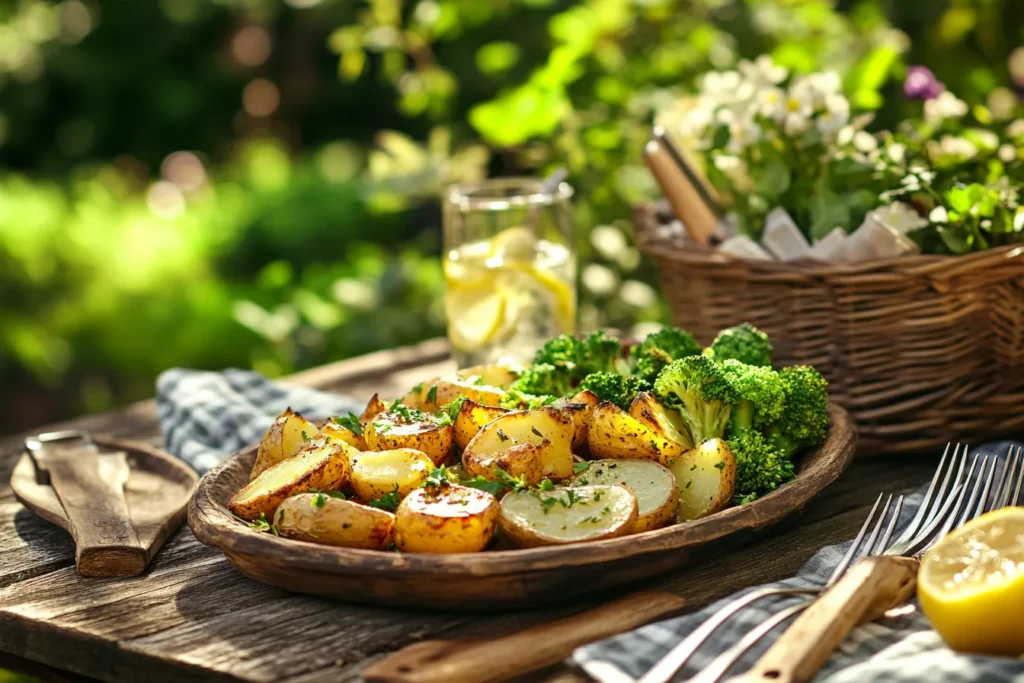Potatoes and broccoli have long been staples in kitchens worldwide. While both are popular, their health benefits often spark curiosity. So, are potatoes and broccoli healthy? The answer is a resounding yes! These vegetables pack impressive nutrients, making them excellent choices for a balanced diet. Let’s dive deeper into their nutritional profiles and learn why they deserve a place on your plate.
Exploring Potatoes and Broccoli Nutrition: A Healthy Choice for Your Diet
Why These Vegetables Are Popular
Potatoes and broccoli are kitchen heroes for good reason. Potatoes, with their versatility and satisfying texture, are a favorite across cuisines. Whether mashed, roasted, or baked, they adapt to countless recipes. On the other hand, broccoli is celebrated as a superfood. Its vibrant green florets often top salads or accompany proteins in stir-fries.
But popularity doesn’t always equal healthiness, right? Well, that’s where science comes in. These two veggies bring serious nutrition to the table.
Common Misconceptions About Their Health Benefits
Potatoes often get a bad rap, especially in the health world. Critics claim they’re carb-heavy or lead to weight gain. However, this only applies when they’re fried or loaded with unhealthy toppings. Similarly, broccoli has skeptics. Some people believe cooking destroys its nutrients entirely, but that’s not the full story.
Understanding their real benefits can clear up these misconceptions, so let’s get to the good stuff!
Nutritional Benefits of Potatoes
Vitamins and Minerals in Potatoes
Potatoes are rich in essential nutrients. A medium-sized potato provides:
- Vitamin C: Boosts your immune system and helps with skin health.
- Potassium: Supports muscle function and regulates blood pressure.
- Vitamin B6: Aids in brain development and function.
These spuds also contain magnesium, iron, and small amounts of protein. They’re more than just carbs—they’re nutrient powerhouses.
How Potatoes Support Energy and Satiety
Potatoes are an excellent source of complex carbohydrates. These carbs provide slow-burning energy, keeping you full for longer periods. This makes potatoes perfect for anyone with a busy lifestyle or a workout routine. Plus, the fiber content, especially in the skin, supports digestion and promotes satiety.
The Role of Fiber in Potatoes for Digestive Health
Did you know that potato skins are packed with fiber? Including the skin in your meals can help maintain a healthy gut. Fiber not only aids digestion but also prevents constipation and supports overall gut health.
Are All Potatoes Created Equal? White, Sweet, and More
Not all potatoes are the same nutritionally. For instance:
- White Potatoes: Great for potassium and vitamin C.
- Sweet Potatoes: Loaded with beta-carotene, which converts to vitamin A.
- Purple Potatoes: High in antioxidants that combat free radicals.
Choosing different types of potatoes ensures you benefit from a variety of nutrients.
Nutritional Benefits of Broccoli
Vitamins, Minerals, and Antioxidants in Broccoli
Broccoli is a nutrient superstar. It’s packed with:
- Vitamin K: Essential for blood clotting and bone health.
- Vitamin C: Acts as an antioxidant and supports the immune system.
- Folate: Important for cell growth and tissue repair.
Additionally, broccoli contains compounds like sulforaphane, which may help reduce inflammation and fight cancer.
Broccoli’s Role in Bone Health and Immunity
Thanks to its vitamin K and calcium content, broccoli promotes strong bones. It’s especially beneficial for older adults looking to maintain bone density. And let’s not forget the immune boost! Its vitamin C content keeps colds at bay and supports faster recovery.
How Fiber in Broccoli Aids Digestion
Fiber isn’t just a potato benefit—broccoli has it too. With every cup of broccoli, you’re getting a healthy dose of dietary fiber that aids in digestion and supports gut health.
Does Cooking Affect Broccoli’s Nutritional Value?
Here’s the truth: cooking can slightly reduce some nutrients, like vitamin C. However, steaming or sautéing preserves most of its goodness. In fact, cooking broccoli makes some nutrients, like antioxidants, easier for your body to absorb. So, cooked or raw, broccoli remains a nutritional gem.
Comparing Potatoes and Broccoli
When comparing their cooking times, you might wonder, does broccoli cook faster than potatoes? This difference in preparation time can be key to optimizing your meal prep and ensuring both vegetables are perfectly cooked together.
Macronutrient Comparison: Calories, Carbs, Protein, and Fat
Potatoes and broccoli have distinct macronutrient profiles:
- Potatoes: Higher in calories and carbohydrates, making them a great energy source.
- Broccoli: Low in calories but high in protein for a vegetable, ideal for weight management.
Neither contains significant fat, making both excellent choices for heart health.
Micronutrient Comparison: Vitamins, Minerals, and Antioxidants
Broccoli edges out potatoes in antioxidant content, thanks to compounds like lutein and sulforaphane. However, potatoes shine with potassium, a mineral vital for muscle and nerve function. Both are nutrient-dense and complement each other beautifully in a balanced diet.
Which Is Better for Weight Loss or Muscle Building?
For weight loss, broccoli takes the lead due to its low calorie density and high fiber. On the other hand, potatoes, with their carbs and protein, are fantastic for muscle recovery and energy replenishment after workouts. It all depends on your goals!
Do They Complement Each Other in a Healthy Diet?
Absolutely. Potatoes provide energy, while broccoli offers vitamins and antioxidants. Together, they form a powerhouse duo that satisfies taste buds and nutritional needs.
Healthy Ways to Prepare Potatoes and Broccoli
Are Potatoes and Broccoli Healthy When Cooked? Best Methods to Retain Nutrients
The way you cook potatoes and broccoli can significantly impact their nutritional value. To preserve their nutrients, steaming is one of the best methods. Steaming helps broccoli retain its vitamin C, antioxidants, and vibrant green color. Potatoes, especially when steamed or boiled with the skin on, keep most of their potassium and vitamin C intact. If you’re curious about the impact of boiling on potatoes before roasting, check out this guide on whether it’s better to boil potatoes before roasting.
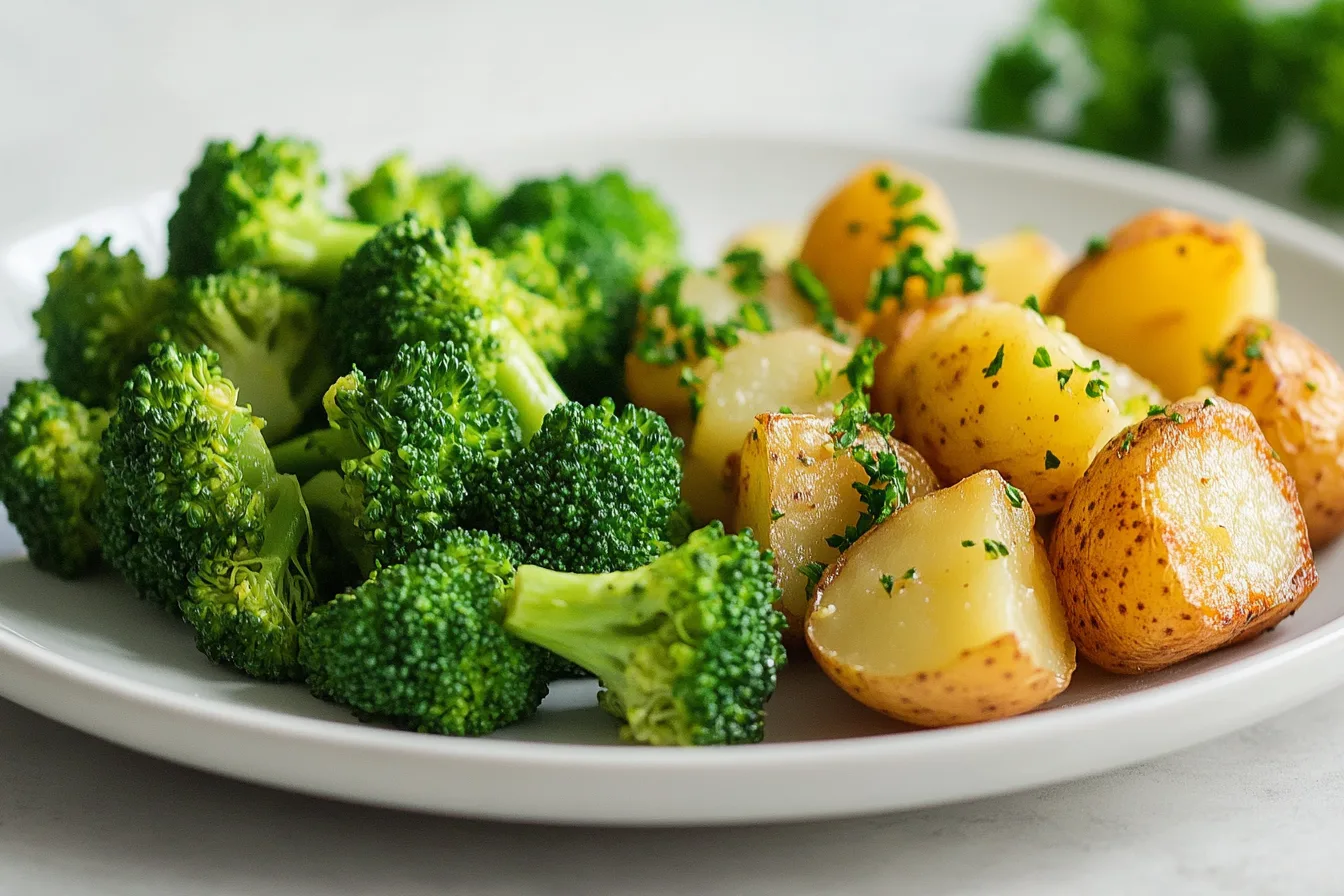
Another great option is roasting. Roasting enhances the natural flavors of both potatoes and broccoli without the need for excessive oils or seasonings. When roasting, keep the temperature moderate and avoid burning them, as this can reduce their nutritional benefits.
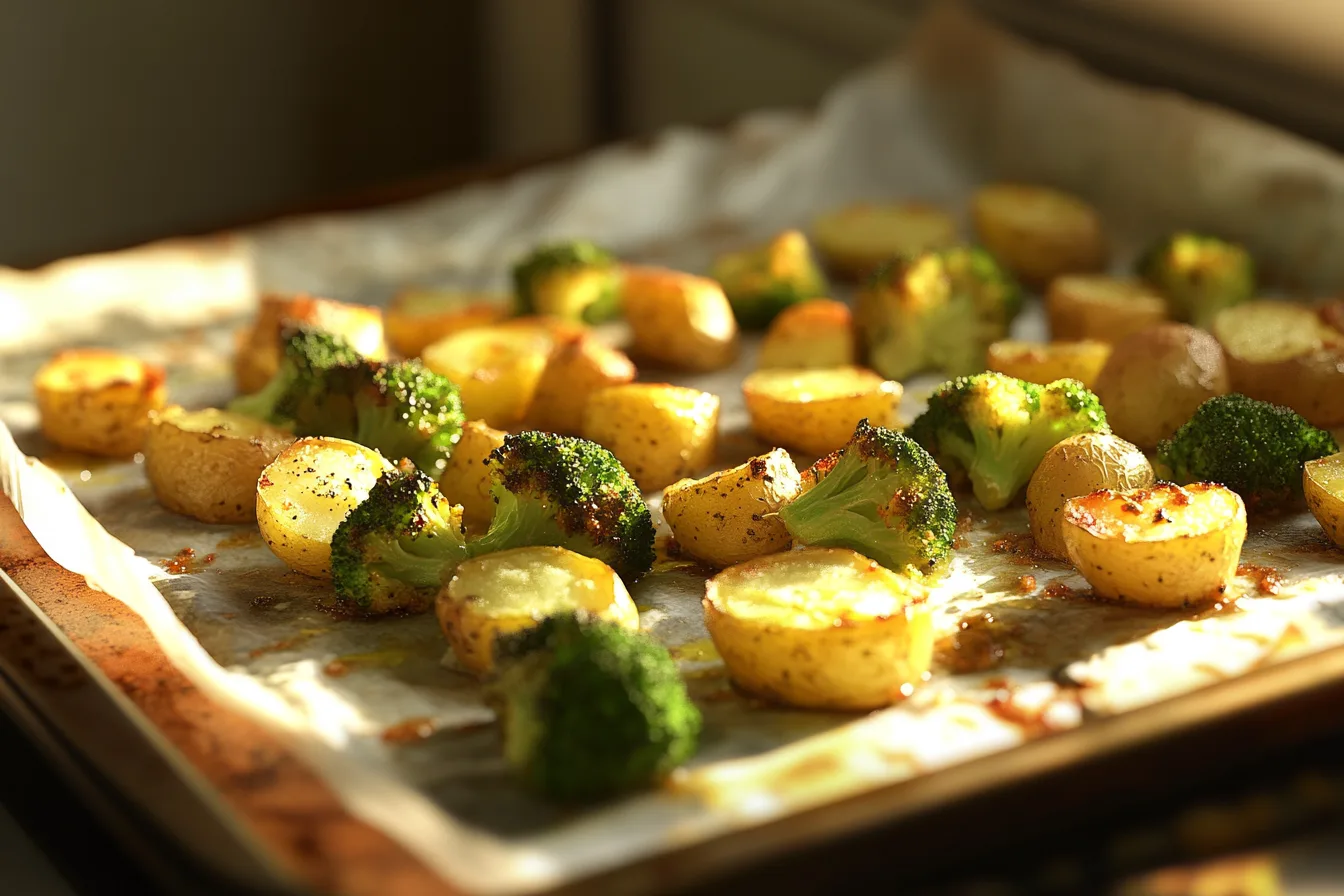
If you prefer a crunchier texture, air-frying is a fantastic alternative. It minimizes oil use while keeping the vegetables crispy and delicious. These methods not only preserve nutrients but also enhance the taste.
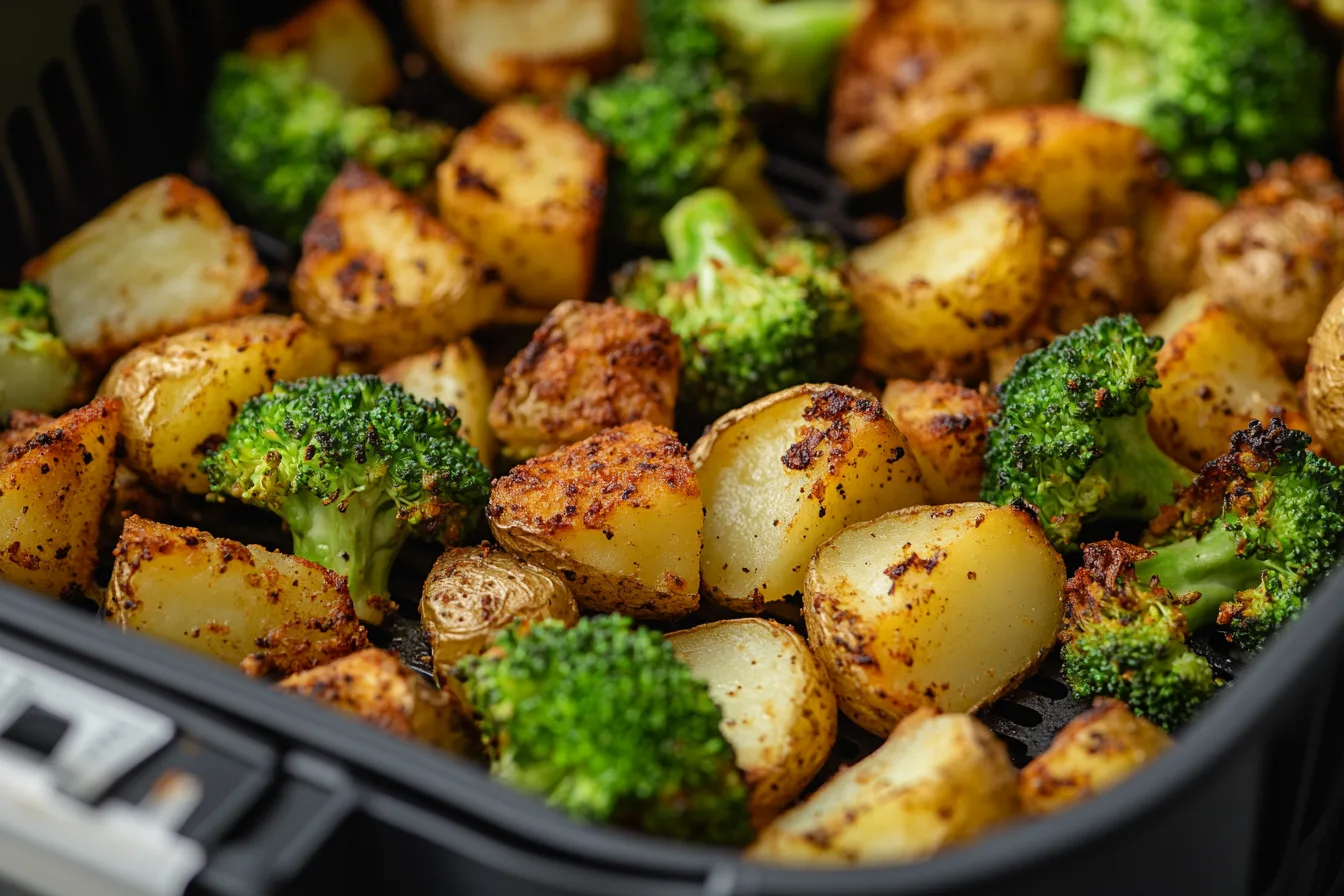
Are Raw, Steamed, or Roasted Better for Health?
Each cooking method has its advantages. Eating raw broccoli can provide maximum vitamin C, as it’s heat-sensitive and can degrade during cooking. However, cooking releases other beneficial compounds like sulforaphane, making steamed broccoli an excellent choice.
For potatoes, raw consumption isn’t common due to their texture and flavor. Cooking them—whether baked, boiled, or roasted—not only improves their taste but also makes their starches easier to digest. The healthiest choice depends on your preference and the dish you’re preparing.
Creative Recipes to Pair Potatoes and Broccoli
Combining potatoes and broccoli can create nutritious, delicious dishes. Here are some ideas:
- Loaded Baked Potatoes with Steamed Broccoli: Use a baked potato as a base and top it with steamed broccoli, a sprinkle of cheese, and a dollop of Greek yogurt for a healthy twist.

- Potato and Broccoli Stir-Fry: Sauté diced potatoes and broccoli florets with olive oil, garlic, and a splash of soy sauce for a quick, flavorful side dish.
- Creamy Broccoli and Potato Soup: Blend boiled potatoes and steamed broccoli with vegetable broth, garlic, and onions for a hearty, nutritious soup.
These recipes are simple, nutritious, and versatile enough to suit various occasions.
Meal Prep Ideas for Busy Weeknights
For busy weeknights, prepping potatoes and broccoli in advance can save time while keeping meals healthy. Roast a batch of cubed potatoes and broccoli florets at the start of the week. Store them in separate containers for use in salads, wraps, or as side dishes.
You can also steam both vegetables and mix them with quinoa or rice for a balanced lunch. Prepping in advance ensures you always have a quick, healthy option ready when hunger strikes.
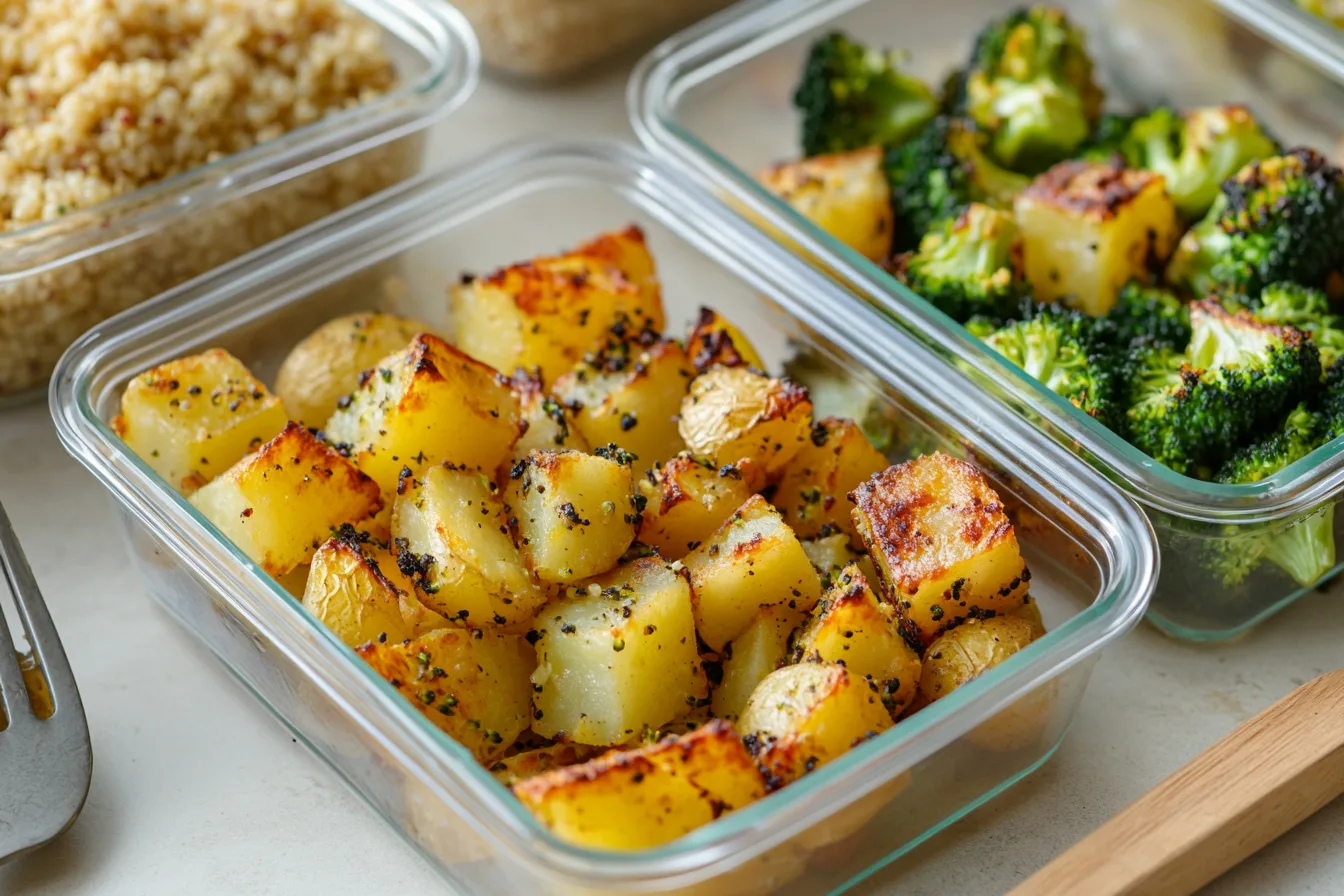
Tips for Adding Potatoes and Broccoli to Your Diet
How to Balance Portions for a Healthy Plate
While potatoes and broccoli are healthy, balance is essential. A well-rounded plate includes a mix of vegetables, lean proteins, and whole grains. Aim to fill half your plate with vegetables, including broccoli, and reserve a quarter for potatoes as your carbohydrate source.
This approach helps control calorie intake while ensuring you get the nutrients your body needs. For an added boost, pair them with a healthy fat, like olive oil or avocado.
Budget-Friendly Ways to Enjoy the Health Benefits of Potatoes and Broccoli
Both potatoes and broccoli are budget-friendly. Buying them in bulk or when they’re in season can save money. Frozen broccoli is also an excellent choice, as it’s affordable and retains most of its nutrients.
For potatoes, choose larger bags or local markets for better deals. Simple meals like potato and broccoli casseroles or stir-fries are cost-effective and nutritious.
Substitutions for Potatoes and Broccoli in Recipes
If you want variety, consider substituting sweet potatoes for white potatoes. They offer a different flavor and higher beta-carotene content. For broccoli, try cauliflower as a substitute. It has a similar texture and mild flavor, making it a versatile alternative.
These swaps can add diversity to your meals without sacrificing nutrition.
FAQs About Potatoes and Broccoli
- Are potatoes fattening if eaten daily?
Potatoes are not fattening on their own. The issue lies in how they’re prepared. Baking or boiling potatoes is healthy, but frying them or adding excessive butter and cheese can increase calorie intake. Stick to healthier preparations for daily consumption. - Is broccoli healthier raw or cooked?
Both raw and cooked broccoli have health benefits. Raw broccoli retains more vitamin C, while cooked broccoli releases sulforaphane, a compound with potential anti-cancer properties. Incorporating both into your diet provides the best of both worlds. - Can these vegetables help with weight loss?
Yes, potatoes and broccoli can support weight loss. Potatoes provide energy and keep you full due to their fiber content, while broccoli is low in calories and high in nutrients, making it an excellent choice for weight management. - Are there any downsides to eating too much of these vegetables?
While both are healthy, moderation is key. Overeating potatoes can lead to excess calorie consumption, especially if paired with high-fat toppings. Broccoli, when eaten in extremely large amounts, may cause bloating due to its fiber content. Balance is essential. - How do potatoes and broccoli compare to other vegetables?
Potatoes are higher in carbohydrates compared to leafy greens or zucchini, making them a better energy source. Broccoli, with its antioxidants and fiber, stands out as a nutritional powerhouse. Both complement a varied diet perfectly.
